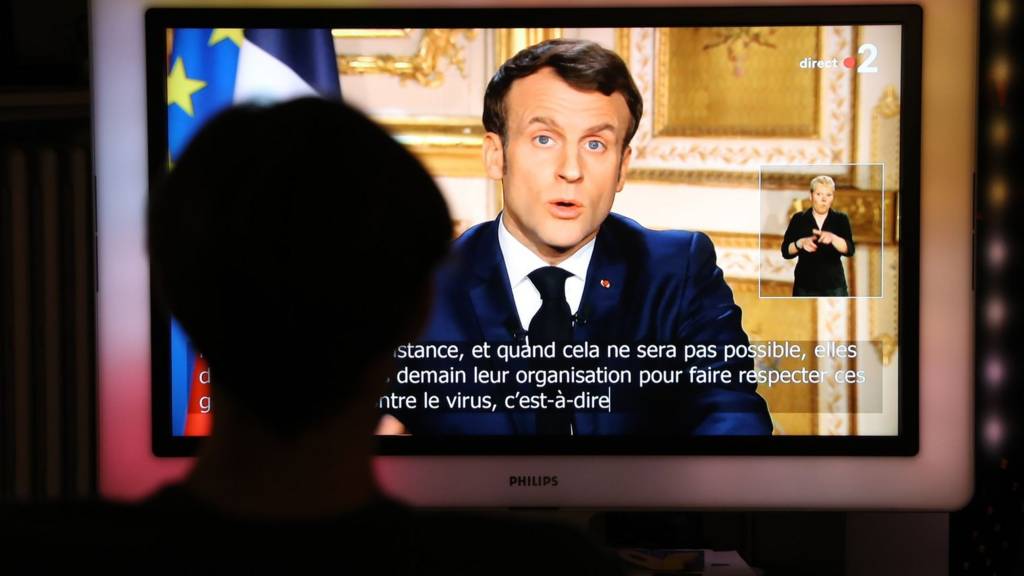
As it happened: Europe tightens virus curbs
UK tightens virus restrictions; Germany shuts down public venues; Stocks plunge despite global central bank action; New York City shuts down schools, restaurants and theatres; First human trial of vaccine; Acts of kindness as virus spreads
Related Video and Audio
RTL

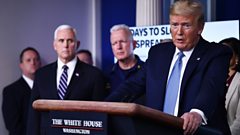


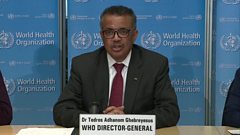

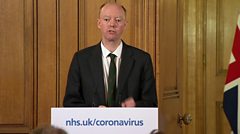





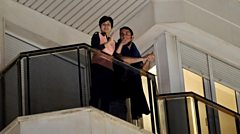

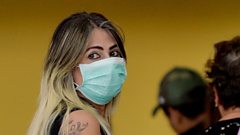
Live Reporting
Georgina Rannard, Kevin Ponniah, Joshua Nevett, Yvette Tan, Andreas Illmer, Owen Amos, Ashitha Nagesh, George Wright and Gavin Stamp
All times stated are UK
Get involved
-
The number of coronavirus infections is now higher outside China than in the country where the outbreak began. More than 180,000 cases have been reported worldwide. At least 7,007 people have died.
-
The UK, France and Germany introduced stringent new measures. Britons are strongly advised to socially distance, avoiding offices, shops and bars. From Tuesday France will be in nationwide lockdown and infractions could be punished. And in Germany, most non-grocery shops and venues have been ordered to shut. The Western Balkans closed shops and schools, while Switzerland declared a national emergency.
-
The death rate in Italy - Europe's worst-hit country - jumped by 349, bringing total fatalities there to more than 2,100. In Iran, another hotspot, the death toll reached at least 853
-
President Donald Trump said the US outbreak could last all summer, and said gatherings should not be larger than 10 people
-
The global economy showed further signs that a recession could be coming, as US stock markets plunged.
-
The World Health Organization warned governments that testing people, tracing cases and isolating patients are the only ways to stop the pandemic
-
Airlines are cancelling flights worldwide as demand for travel collapses
-
Borders continue to close globally. India and Russia have banned visitors from the UK and EU. On Tuesday EU leaders will meet to discuss a proposal to shut the EU's borders

BBCCopyright: BBC 

Science Photo LibraryCopyright: Science Photo Library -
Chronic respiratory diseases, such as asthma and bronchitis
-
Heart disease
-
Kidney disease
-
Hepatitis
-
Chronic neurological diseases, including Parkinson's and Motor Neurone disease
-
Those with a weakened immune system as a result of treatment for HIV and cancer
-
People with severe chest conditions such as cystic fibrosis
-
Spending time doing favourite hobbies, such as reading or cooking
-
Eating healthily, exercising regularly and avoiding smoking, alcohol and drugs
-
Keeping windows open to let in fresh air and getting some natural sunlight


Getty ImagesCopyright: Getty Images A drive-through in a health centre in West Palm Beach, Florida offers testingImage caption: A drive-through in a health centre in West Palm Beach, Florida offers testing 
Red ElmadhiCopyright: Red Elmadhi Dr Red Elmahdi is a specialist in sexually transmitted infectious disease epidemiologyImage caption: Dr Red Elmahdi is a specialist in sexually transmitted infectious disease epidemiology 
BBCCopyright: BBC Rajesh Makwana says his food bank in Brent was pre-packaging goods into parcels to prevent germs spreadingImage caption: Rajesh Makwana says his food bank in Brent was pre-packaging goods into parcels to prevent germs spreading 
Getty ImagesCopyright: Getty Images President Trump said postponing US elections would be "unnecessary"Image caption: President Trump said postponing US elections would be "unnecessary" - Biden wants woman VP and other debate takeaways
- Joe Biden extends lead over rival Bernie Sanders
- Is this the beginning of the end for Sanders?
View more on twitterView more on twitter 
BBCCopyright: BBC -
The National Theatre in London is cancelling all performances until further notice.
-
Leeds Playhouse has cancelled tonight's performances of Be The Example, Be The Voice and Missing People and said it would be seeking advice on future performances
-
The Ambassador Theatre Group UK is suspending shows at all its venues with immediate effect - this includes the Edinburgh Playhouse, the Savoy Theatre in London, the Manchester Opera House and the Theatre Royal Brighton

Getty ImagesCopyright: Getty Images Authorities have started implementing the lockdown in ManilaImage caption: Authorities have started implementing the lockdown in Manila - Everyone should avoid socialising and unecessary travel, and work from home where possible, Prime Minister Boris Johnson said
-
If one person in any household develops a cough or fever, everyone living there should stay home for 14 days
-
By next weekend, those with the most serious health conditions must be "largely shielded from social contact for around 12 weeks"
-
The UK is now "three weeks" behind Italy - the worst-hit country in Europe. In London, the virus is spreading more rapidly than elsewhere, the PM said.
-
French President Emmanuel Macron ordered a nationwide lockdown, starting on Tuesday at midday and lasting for at least two weeks. Anyone breaking the quarantine could be punished
-
The European Union will close its borders for 30 days from tomorrow to external visitors from non-EU countries, Mr Macron said, but travel with Switzerland and the UK will be preserved
-
Germany announced stringent new measures that will close most shops and venues, and closed borders with several neighbours
-
Switzerland declared a national emergency, closing public venues and borders
-
President Trump said that people should avoid meeting in groups of more than 10, but that a nationwide quarantine is not yet planned
-
The outbreak will last "until July or August, or perhaps longer", the president said
-
Millenials in particular are strongly encouraged to stop socialising and stay at home
- Global stocks plunged despite central banks taking action to ease the impact of the pandemic, including a Federal Reserve rate cut in the US
-
The Dow Jones closed 12.9% down, the biggest fall in a day since 1987
-
President Trump said the economy "may be" heading for a recession
-
London's FTSE 100 ended 4% lower and other European markets saw similar falls

Getty ImagesCopyright: Getty Images 
PACopyright: PA 
BBCCopyright: BBC Ljubljana's usually busy streets are now desertedImage caption: Ljubljana's usually busy streets are now deserted Video caption: WATCH - coronavirus questions answeredWATCH - coronavirus questions answered -
Why is the UK not testing every single case?
-
Is it possible to have the virus if you don't have a fever?
-
What is considered a serious underlying condition?

BBCCopyright: BBC Swiss residents like Nadine are heading to the bars for a last beerImage caption: Swiss residents like Nadine are heading to the bars for a last beer
Latest PostA round-up of Monday's developments
We're closing our live coverage shortly. First a recap on another day of developments that at times came at breakneck speed - here's the main points:
Read more on how to steps to take to prevent infection and how to protect your mental health during the pandemic.
Labour's Corbyn in talks with the PM in Downing Street
Jeremy Corbyn, the leader of the UK's Labour Party, has this evening been holding talks with Prime Minister Boris Johnson in Downing Street.
Speaking afterwards to the BBC, he said he supported many of the measures announced earlier but was critical of the government’s communication strategy and lack of support for citizens on low incomes.
"If this virus affects us all, as it does, we all have to be treated fairly and properly in this," he said.
He said he had told the PM that testing for the virus, particularly among NHS workers was "inadequate" and he was worried about the lack of ventilators and trained staff.
Mr Corbyn, who stands down next month, also said he would not be self-isolating even though he’s over 70.
Dire prediction sees shift in UK strategy
James Gallagher
Health and science correspondent, BBC News
The UK's plan has shifted because the scientific modelling showed we were on course for a "catastrophic epidemic".
A strategy of just slowing the spread of the virus, but not trying to stop it, would have overwhelmed intensive care units.
The modelling by Imperial College London has been heavily informed by the experience in Italy and is influencing decisions at the heart of government.
Their calculations predicted 260,000 deaths in the UK.
Instead the plan is to drive down the number of cases to very low levels, which the models predict will limit deaths from coronavirus to the thousands or tens of thousands.
However, this approach comes with a major problem - there is no exit strategy.
Without the immunity that would build up if people were infected, then cases would soar as soon as measures are lifted.
The report said these could need to be in place until a vaccine is available, which could take up to 18 months.
We are in this for the long haul.
More on England's social distancing advice
Public Health England has published more details about the social distancing recommendations announced earlier by Prime Minister Boris Johnson.
It says those aged over 70 and pregnant women are among those who should "stringently" follow the advice on avoiding non-essential use of public transport, working from home and not having friends and family to visit.
And it warns that anyone under 70 with a range of underlying health conditions is also at increased risk of suffering "severe" illness. The conditions it lists include:
It also gives some tips to people on how to look after their mental health in the tough weeks and months ahead. It says people shouldn't fear going for a walk outdoors if they stay more than 2 metres from others.
Other advice includes:
France to mobilise 100,000 police to enforce lockdown
France will deploy 100,000 police officers to ensure that people abide by restrictions on movement to avoid the spread of coronavirus, its interior minister has said.
Christophe Castaner said people who venture outside their homes will have to justify their reason for doing so.
Speaking at a news conference, he said people may be fined if they break the rules.
Exceptions will be made in some circumstances, including for travel between home and work, Mr Castaner said.
"Too many people still disregard the health instructions given," Mr Castaner said.
His announcement comes after French President Emmanuel Macron unveiled a series of drastic new measures designed to stem the spread of coronavirus.
From Tuesday, people should stay at home unless they are buying groceries, travelling to work, exercising or seeking medical care, Mr Macron said.
What's the testing situation in the US?
Helier Cheung
BBC News
The World Health Organization warned on Monday that testing is essential to stopping the pandemic. Questions have been raised in the US about the government's approach to testing and how widely available test kits are. So what's the situation there? It's hard to tell - and even officials have struggled to say how many individuals have been tested.
According to the latest figures, the Center for Disease Control and Prevention and public health labs have tested over 25,100 specimens for Coronavirus. But that number doesn't give a full picture of how many people were tested - because many people provide more than one specimen for testing, and many private health laboratories are also conducting tests.
One project by The Atlantic estimates that 41,550 people in the US have been tested. But that's still fewer than many other countries with smaller populations - including South Korea, which has tested 240,000, and the UK, which has tested 44,100.
The government has come under heavy criticism - from both Democratic and Republican lawmakers - over the lack of tests. President Trump has now promised that five million tests will be available within a month - but also warned: "We don't want everyone running out and taking [the test] - only if you have certain symptoms."
Read more about the US and coronavirus testing here.
British doctor overseas returns to support NHS
Some British doctors working overseas are returning to the UK to help treat patients in the coronavirus outbreak, one doctor has told BBC News.
Red Elmahdi, who completed her medical training in the UK before specialising in epidemiology research, has flown back from the lab where she was working in Denmark.
"There’s little point my sitting around in lockdown doing research from home in Denmark when I’m seeing the mounting strain on the NHS," she explains.
However Dr Elmahdi says there has been no central co-ordination and she is relying on her locum agency to be placed in hospital.
Foodbank closes 'due to the outbreak'
Food banks in the UK say they are experiencing a shortage of basic items because shoppers are stockpiling as fears grow over the spread of coronavirus.
Organisers of one in Islington, north London, announced they had decided to close due to dwindling food supplies and a desire to protect the "health and safety of our volunteers and clients".
Other food banks across the UK have said some items including pasta and rice are hard to get.
It comes after UK supermarkets urged shoppers not to buy more than they need amid concern over coronavirus-linked stockpiling.
Postponing US elections 'unnecessary', Trump says
President Trump has rebuffed growing calls for US elections to be postponed, calling such a move "unnecessary".
Four US states - Ohio, Illinois, Florida and Arizona - are scheduled to host primaries for the Democratic presidential nomination on Tuesday.
Ohio’s Republican governor Mike DeWine has said he will file a lawsuit to postpone the election in his state until 2 June, 2020.
In his news conference at the White House, Mr Trump did not seem open to the suggestion of postponement.
"Postponing elections is not a very good thing," Mr Trump said. "I think postponing is unnecessary."
He suggested elections could be held safely by "spreading people out".
“They have lots of room in lots of electoral places,” Mr Trump said.
Read more about the race for the Democratic presidential candidacy:
The primaries will determine which Democrat faces Mr Trump in November's presidential election, with Joe Biden and Bernie Sanders both vying for the candidacy.
Measures could 'devastate' UK creative industries
Earlier this evening the UK government announced a number of new measures including advising people to avoid gatherings and crowded places. Here is a taste of how theatres in the UK have reacted:
Head of the Creative Industries Federation and Creative England Caroline Norbury says the measures have the potential to "devastate" the UK's theatres, museums, cinemas and venues as well as those who work in the industry.
She says that as the social-distancing measures are "only advisory rather than an outright ban", creative organisations may be unable to claim compensation for the losses they could experience.
"It is vital that government puts in place support to ensure that our world-leading creative sector is able to survive Covid-19," she added.
Foreign tourists have 72 hours to leave Philippines
Howard Johnson
Philippines Correspondent, BBC News
Foreign tourists intending to leave the Philippines from international airports in the country’s main Luzon region have been given 72 hours to do so, starting from 16:00 GMT today.
Philippine President Rodrigo Duterte earlier announced that Luzon, which has an estimated population of more than 50 million people and includes the capital city, Metro Manila, is to be placed under strict “enhanced community quarantine” until 12 April.
The British embassy in Manila says “a small number” of British nationals are affected. On Sunday, Britons were advised against all but essential travel to the Philippines.
The government says the country currently has a total of 142 confirmed Covid-19 cases with 12 deaths.
But Dr Manuel Dayrit, the country’s health secretary during the SARS outbreak of 2003, believes the number is relatively low compared with other countries because not enough preemptive testing has been taking place.
“We are actually limited by the fact we are not doing any testing for COVID-19 in the community,” Dr Dayrit told BBC News.
“We are only testing the patients that show up in the hospitals usually with pneumonia, so we can only speculate how extensive community spread is.”
A round-up of a dramatic few hours
It's been a whirlwind few hours with dramatic announcements from both sides of the Atlantic and beyond.
Here's what you need to know:
In the UK:
In other European countries:
In the US:
In the markets:
Grand National cancelled
Aintree Racecourse has announced that this year's Grand National on 4 April will not take place because of the coronavirus pandemic.
The Grand National is one of the key events in the horse racing calendar and attracts an estimated global TV audience of 600 million.
In 2019 bookmakers said about £150m ($184m) was bet on the race.
Labour: We will stand with all communities during crisis
Jeremy Corbyn - leader of the UK's Labour Party - has called on Prime Minister Boris Johnson to extend full sick pay and lost earnings protection to all workers required to self-isolate.
He is also urging the government to reduce the waiting time for new universal credit claimants, ban eviction of tenants affected by the outbreak and raise statutory sick pay in line with other European countries.
"Jeremy Corbyn will emphasise that Labour stands with all communities during this crisis, and that the opposition will hold the government to account to ensure no-one is left behind," a party spokesman said.
Earlier today, Mr Johnson advised everyone in the UK to avoid "non-essential" travel and contact with others to fight the spread of Covid-19.
Read all the details here.
'Hiking is not vital at this time of war'
Guy De Launey, BBC Balkans Correspondent
Countries in the Western Balkans and the former Yugoslavia have closed schools, shops and borders to contain the coronavirus outbreak.
In Slovenia’s capital, Ljubljana, the Monday afternoon streets were quieter than a standard Sunday morning. Public transport was not running, though adverts on the video screens next to the deserted bus stops reminded the non-existent passengers to practise good hygiene.
Further down the Balkan peninsula, borders have closed.
Croatia imposed a 14-day self-isolation period for many arrivals; Serbia has simply sealed its borders to almost everyone.
As Serbia is not an EU member, it is counting on help from elsewhere. President Aleksandar Vucic says China is suppling masks, ventilators and doctors.
Albania imposed a strict lockdown over the weekend and imposed a 6pm curfew from today. Even a daytime stroll in the park has been ruled out by Prime Minister Edi Rama.
“Hiking is not vital at this time of war,” he said on his Facebook page.
Coronavirus: Your questions answered
Video content
If you've got some questions about the virus, and particularly the response in the UK, this video is for you.
The BBC's Clive Myrie is joined by BBC Health Editor Hugh Pym and other experts to answer questions including:
Russia bans entry to foreigners until May
Russia has temporarily banned all foreigners from entering the country, following other nations worldwide in restricting travel over the coronavirus pandemic.
The ban will come into effect on 18 March and will remain in place until 1 May, the government said on Monday.
Exceptions will be made for diplomats and permanent residents. Some 93 cases of the virus have been reported so far in Russia.
Russia has been accused of spreading disinformation about the new coronavirus outbreak on social media. It has flatly denied those allegations.
It has also been slow compared to other countries in starting testing. This has led to speculation that the real number of cases is much higher than reported.
Russia's government says up to 100,000 testing kits are being produced daily to start testing in large numbers.
Switzerland declares emergency
Our reporter Imogen Foulkes has this from Geneva:
People here expected the state of emergency - with cases of the virus rising fast, many thought the government should have declared it on Friday, when it announced that schools would close.
But now that it has happened, Switzerland, one of the richest countries in the world, is facing at least a month with everything but the bare essentials closed. There will be no bars, no cafes, no restaurants, no sports, no nightclubs, no cinemas, no museums.
This evening in Bern people are heading to the bars for a last beer. Student Nadine is disappointed that her upcoming birthday party won’t happen, but says complaining feels a bit like a "first world problem".
Actually it’s quite fascinating," she says, "we are at a pivotal moment in history". Historic it certainly is: to support hospitals the Swiss government today mobilised the army, the first time that has happened since the start of World War Two.
BreakingDow closes with biggest drop in three decades
The Dow Jones Industrial Average has closed 12.9% down, in another sign that markets fear a global recession could be on the horizon. It's the biggest percentage daily drop since the outbreak began, and the largest in one day since the Black Monday crash in 1987.
Markets dropped around the world today despite a Federal Reserve interest rate cut in the US and co-ordinated action by central banks around the world to shore up confidence.
The Dow closed as President Trump said a US recession could be on the horizon and that the virus outbreak could last until August.
The other main US indexes - the S&P 500 and the Nasdaq - also plunged 12% in trading on Monday.
US recession could be on horizon - Trump
President Trump has said the US could be heading for a recession due to the coronavirus outbreak.
Reporters at the White House press conference are deliberately putting empty seats between them, in a social distancing effort.
The US government has faced strong criticism for its slow pace of testing. Mr Trump said that before instituting mass testing, South Korea had experienced "tremendous problems and great numbers of death".
"This is something that is an invisible enemy," he said, adding that there was now a cross-party effort to fight it.
"My focus is on getting rid of this problem. This virus problem. After that everything else is going to fall into place."
"We're gonna back the airlines 100 percent. It's not their fault its nobody's fault," he continued, but added: "Unless you go to the regional source."
Read our main story here.